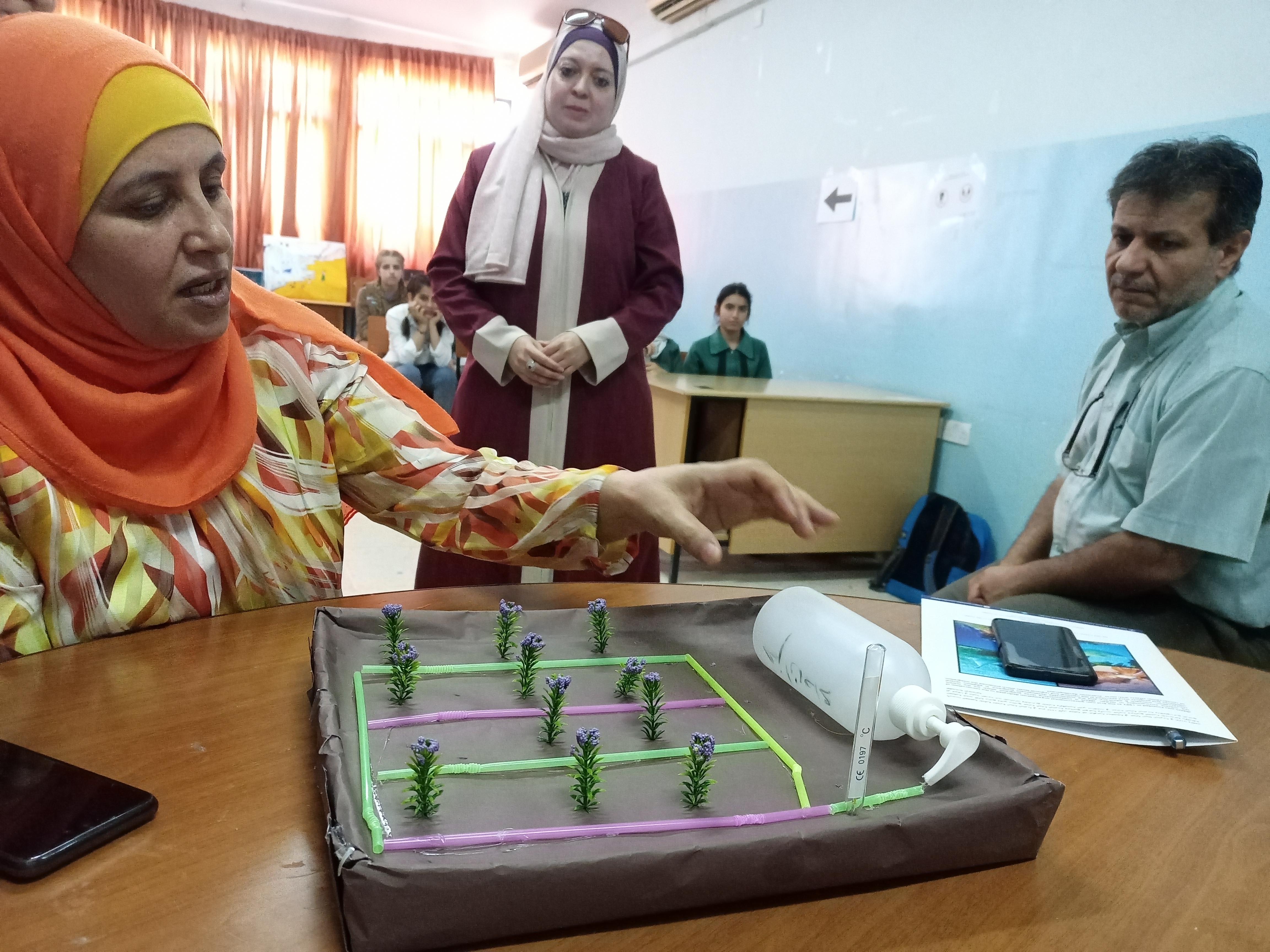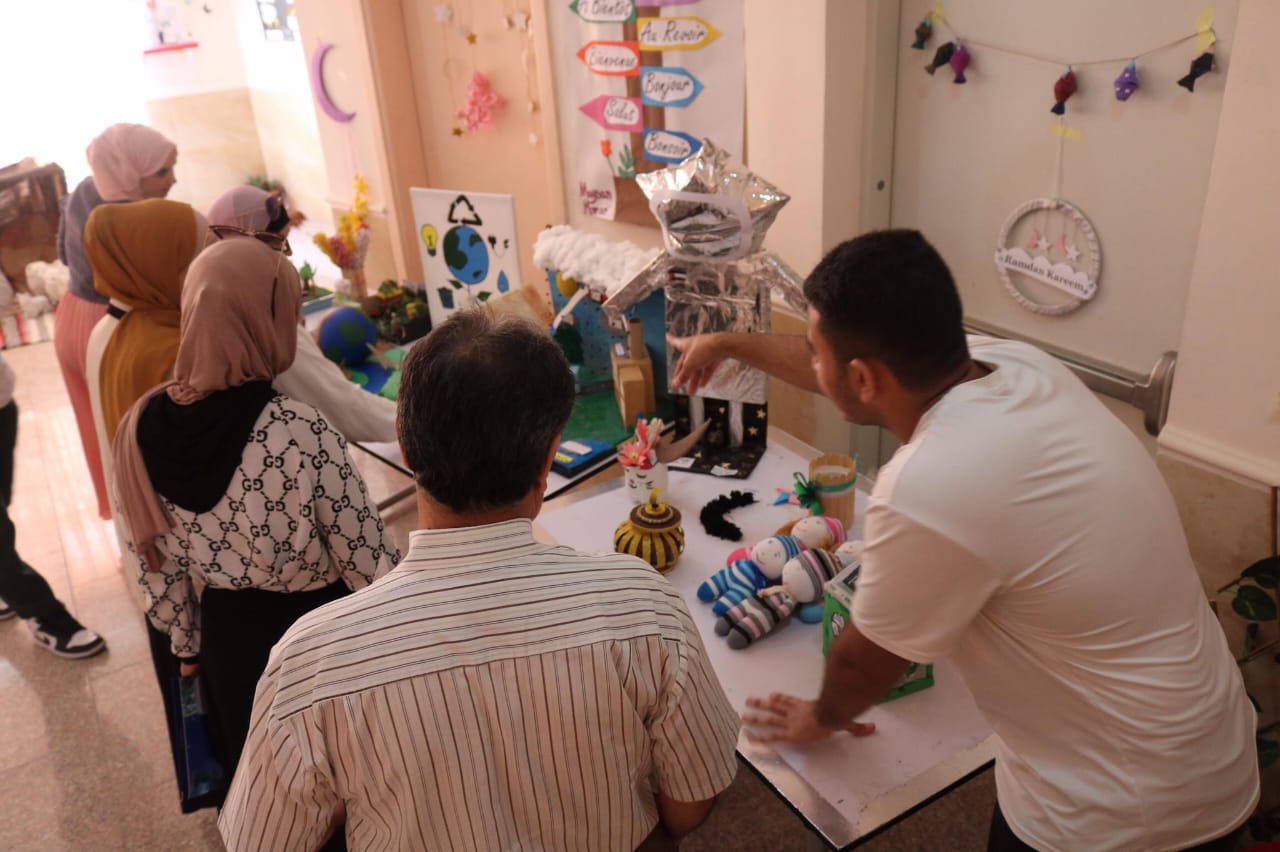Eco-School Program:
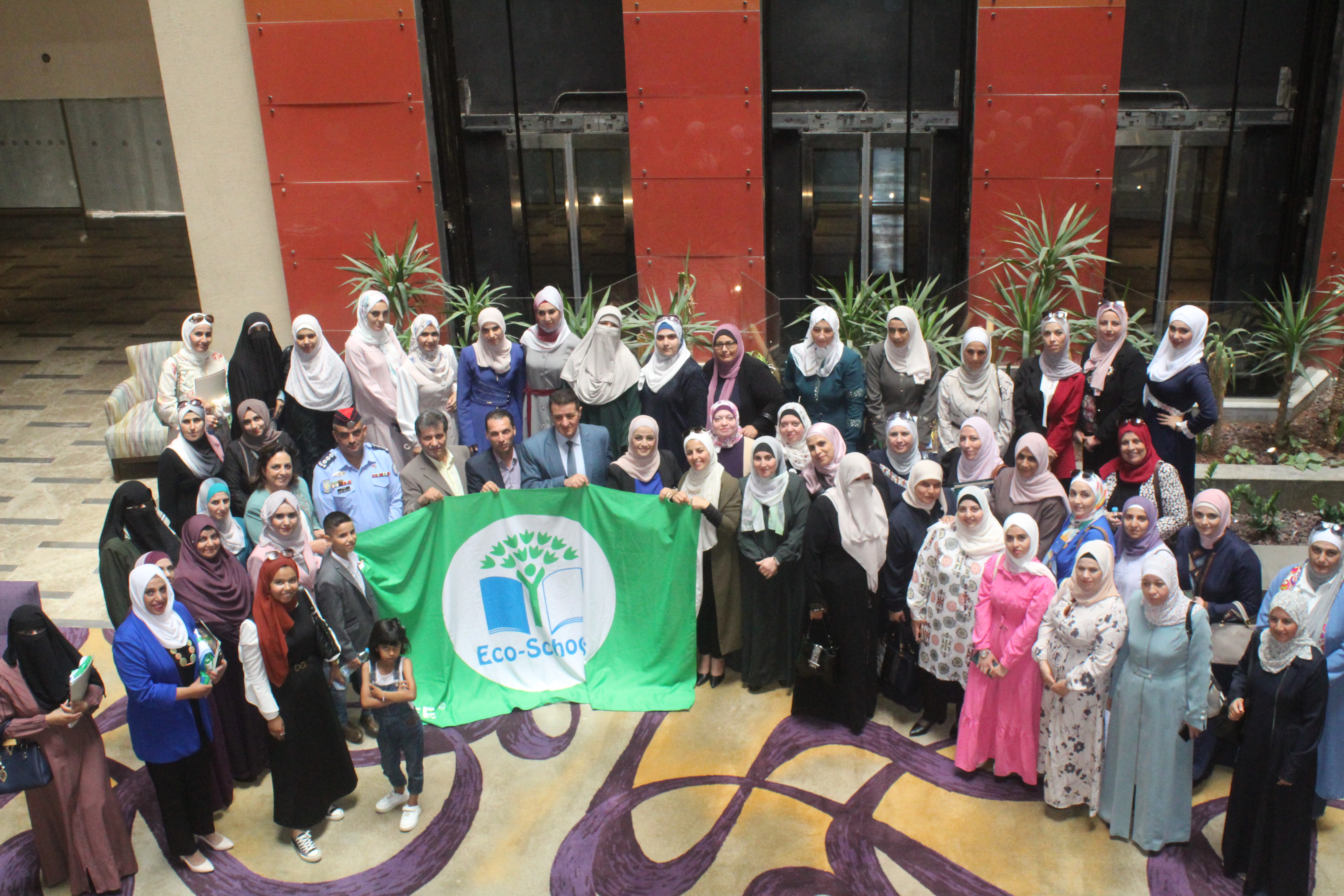 Eco-Schools is the international award for sustainable schools, aims at a structural sustainable change within the participating schools. The focus is on a positive change of behavior (of students, staff, parents and others) and to secure the embedding of sustainability in the curriculum. The award is recognized by the United Nations and presented as an excellent educational example in the evaluation of the Decade of Education for Sustainable Development in Japan 2015.
Eco-Schools is the international award for sustainable schools, aims at a structural sustainable change within the participating schools. The focus is on a positive change of behavior (of students, staff, parents and others) and to secure the embedding of sustainability in the curriculum. The award is recognized by the United Nations and presented as an excellent educational example in the evaluation of the Decade of Education for Sustainable Development in Japan 2015.
Eco-Schools is one of the five programs of FEE-international implemented Over 51.000 schools in 101 countries are running the Eco-Schools program.
In Jordan the Royal Marine Conservation Society of Jordan is the national operator since 2009.
Eco-schools Program History in Jordan
The Eco-schools program was initiated in Amman and Aqaba in 2009, with 15 candidate schools whom received the award for the first at the end of year 2009/2010. Today, JREDS is working with more than 200 schools from Amman, Aqaba, and recently the program was expanded to include new areas in Jordan northern parts such as Irbid, Mafraq, Ramtha and North Shouna as well as the Disi in the southern part of Jordan.
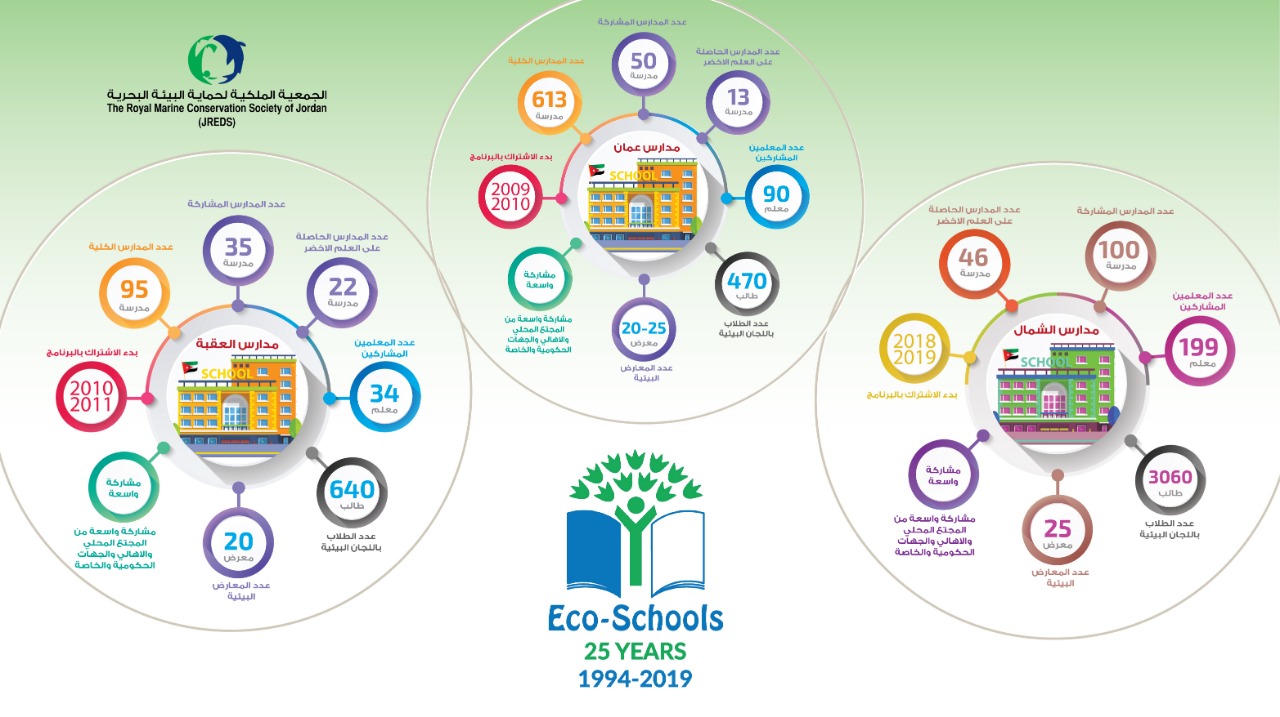
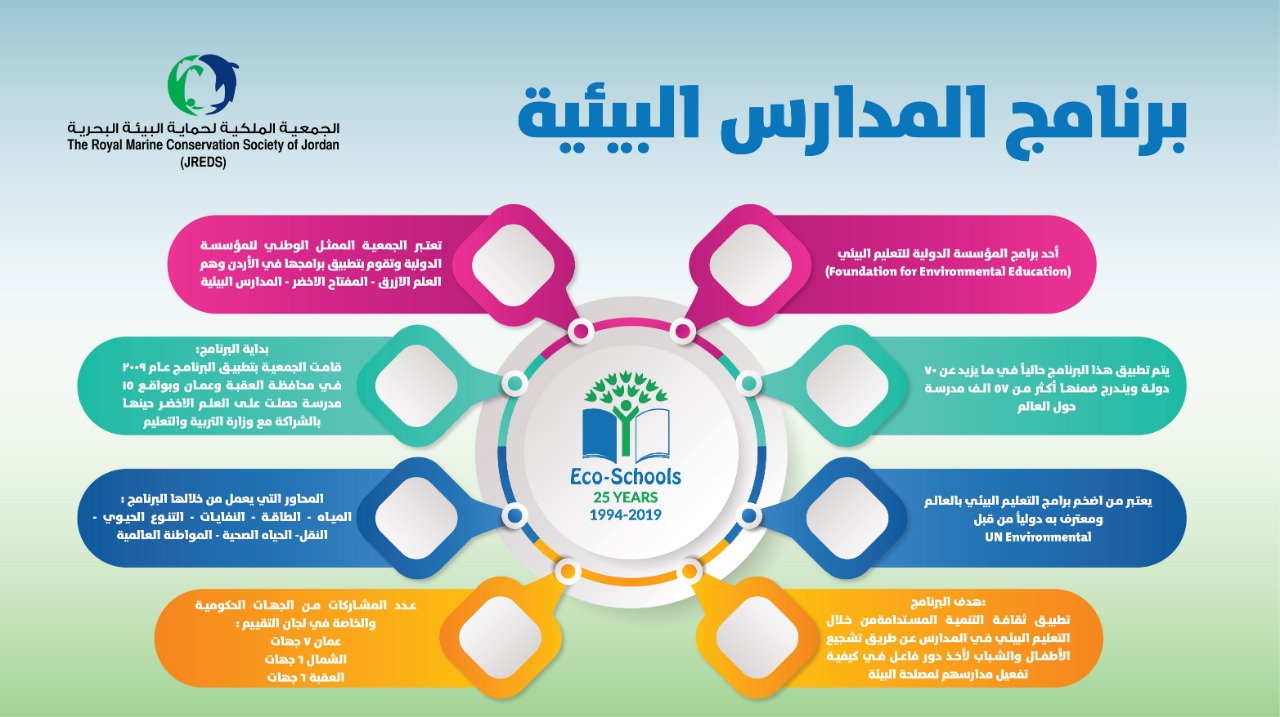
- How it works: 7 steps and 8 themes
Within the Eco-Schools program the approach is ‘student-led change’. The students are in the lead to make the difference. In seven steps the Eco-team will lead the school tot the award: The Green Flag. The Eco-team is in the driver seat of the process of becoming a sustainable school.
- The Eco-team consists of (at least) 10-15 students, 2-3 teachers, the concierge and one member of the management. This team can be broader by asking parents or companies to participate. The Eco-team will meet at least every month to discuss the progress.
- Based on the Environmental Review (step 2, also called the Eco-scan) the school and especially the Eco-team will choose the themes they will work on the following school year. The advice is to focus on two or three themes.
- After the themes have been chosen, the Action Plan will be made. Within the Action Plan the school and Eco-team present the issues they want to tackle, the goals on these issues (SMART formulated) and measures they want to take to reach these goals.
- Certification , The Green Flag
To be eligible for a Green Flag certification, each school must complete the Seven Steps, keep track of all progress in the logbook and submit a portfolio of evidence. The final step is the Green Flag Assessment by an Eco-Schools operator with national jury to see whether or not all requirements have been met. To reach the highest level of the Green Flag the international organization of Eco-Schools international has ordered that an Assessment must be done by the national Eco-Schools operator.
The Green Flag is a process mark. This means that the change process is central. The quality mark is awarded to schools:
- with the will and motivation to continue to grow as a sustainable school,
- who are continuously working to integrate sustainability into all aspects of the school,
- where the involvement of students, teachers and management grows,
- where students are given the space to take initiative and are actively involved in making the school more sustainable,
- who are also able to involve more and more people outside the school to work together on sustainability, for example local residents, local organizations and companies and the municipality,
- who work in a structured way to make the curriculum more sustainable,
- and know how to make more and more connections around sustainability.
With the audit, we therefore look at your good results, but especially also at the development that you are going through as a school. The process is central to the Green Flag, because the road to a sustainable school looks different for each school. Every school has a different starting situation and different challenges. We also do not see sustainability as an end point, but as a development in which the sustainable thinking and acting of people is very important
- Why Eco-Schools
- Be part of a global movement, Eco-Schools is the world's largest quality mark for sustainability at school. By participating, your students are part of a sustainable movement among 68 countries. No fewer than 51,000 schools and 19 million pupils worldwide participate!
- Encourage students to think and act sustainably, With Eco-Schools, students are at the helm of sustainable changes within the school: 'student led change'. Together with a few adults, they form an Eco-team and investigate the school based on a sustainability scan. They then set goals and work on various actions to make people's behavior, the curriculum, and the school environment more sustainable, you not only stimulate students to think and act sustainably, but also let them experience what they can contribute as individuals to a sustainable future.
- Profile yourself as a sustainable school, By participating in Eco-Schools you qualify for the international quality mark for sustainable schools: the Green Flag. This is the way to show as a school that you think it is important to work on sustainability. The quality mark is recognized by the United Nations and is used worldwide. You can only receive this quality mark by participating in Eco-Schools.
- Save money and water / energy / waste: In addition to the sustainable change among students, the school itself is also changing. With Eco-Schools you realize major savings on the themes you are working on, for example less energy, waste, or water. Research shows that no less than 98% of the participating schools see the school becoming more sustainable. In addition to good results in substantive savings, you also realize financial savings with Eco-Schools.
- Go for sustainable education, curriculum and school environment, A transition in education is necessary when working on a sustainable world. Especially in education (curriculum), in the actions of the teachers and the physical environment. This is also called the 'Whole school approach'. Eco-Schools fits in seamlessly with this. With the help of the steps you make education, the organization, and the environment of the school more sustainable.
- Schools awarded in Jordan
There are 53 schools in Jordan that have obtained the international certificate (environmental schools) for the educational year 2023/2024, distributed as follows:
- 20 schools in Amman
- 13 schools in the north of Jordan Irbid
- And 20 schools in Aqaba
